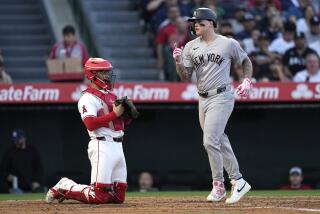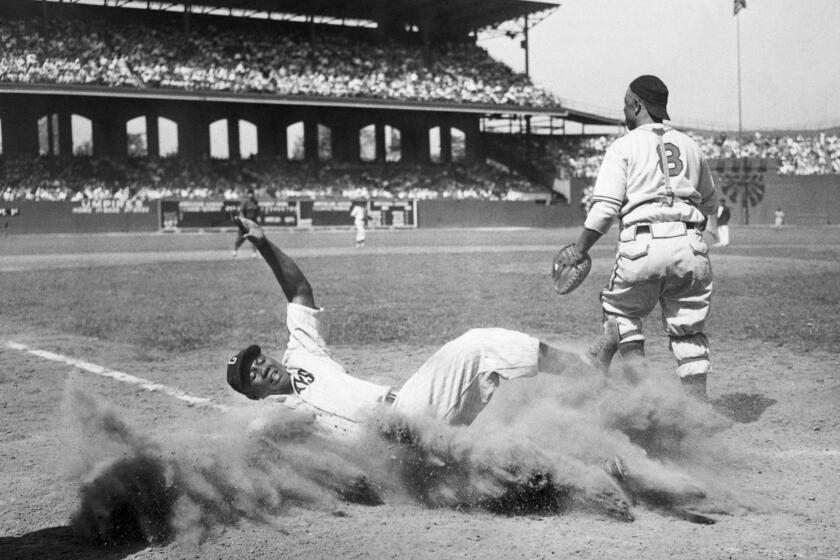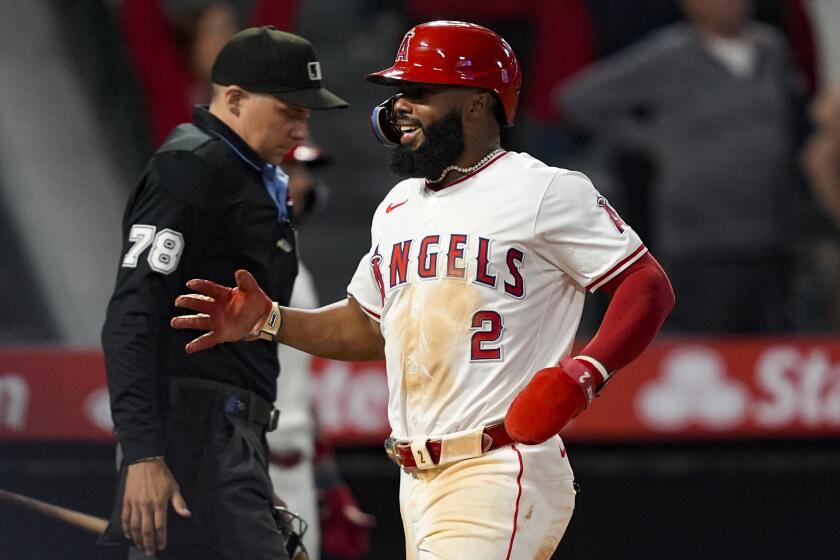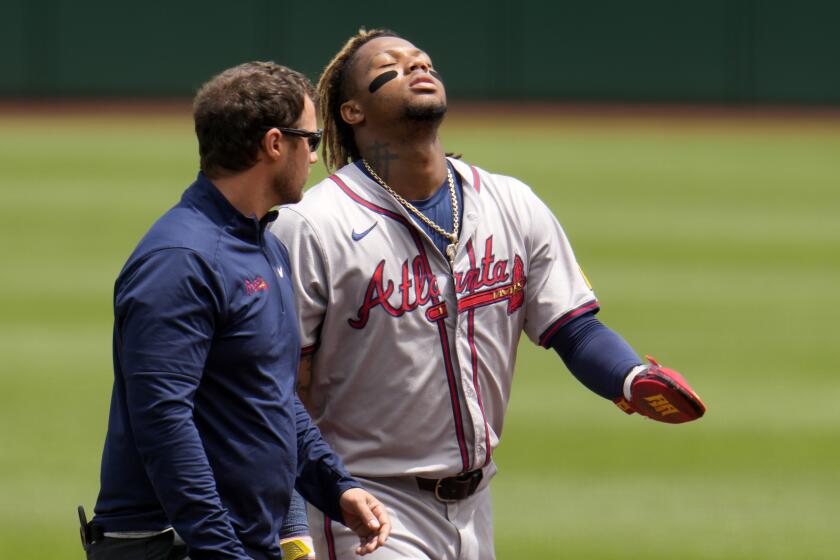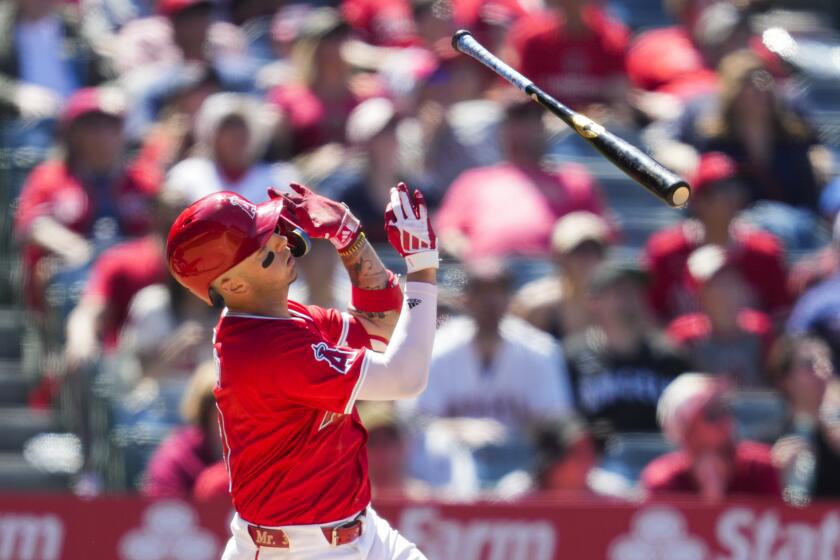THE ROLE OF PAYROLL : Angels Like to Use Incentive Clauses, Dodgers Do Not
If you assumed that the Dodgers would enter the 1987 season with an incentive or two, guess again.
They have none.
Contract incentives, that is.
The Angels, by contrast, have several.
An inspection of the latest official salary figures obtained from management and player sources provides an interesting insight into a difference in contract philosophy between the freeway rivals.
The Dodgers believe in what Vice President Al Campanis calls a bread-and-butter approach, based on straight salary. He believes that incentives, whether based on awards, plate appearances, game appearances or innings pitched, tend to breed problems.
Mike Port, the Angels’ general manager, believes that incentives are an effective tool in bridging negotiation differences and can help bring about lower guaranteed salaries.
Don Sutton, for example, is guaranteed $550,000 in 1987, less than might be expected for a 310-game winner. But Sutton turned 42 Thursday. When his two-year contract was negotiated, the Angels were concerned about Sutton’s continuing effectiveness and resiliency.
Thus, in agreeing to a lower guarantee, the sides also agreed to an incentive program through which Sutton can earn another $340,000, depending on how many games he starts.
He will get $40,000 for 20 starts, $100,000 for 25, another $100,000 for 30 and still another $100,000 for 33.
Mike Witt will receive $850,000 in salary and $300,000 in incentives if he pitches more than 240 innings and wins the Cy Young Award.
Donnie Moore can make $250,000 on top of his $850,000 salary, John Candelaria can make $250,000 in addition to his $800,000 salary and Butch Wynegar can make $150,000 in addition to a salary of $700,000.
Right fielder Devon White and second baseman Mark McLemore, the touted newcomers, can make $10,000 for winning the Rookie of the Year award.
The Angels’ payroll could expand by about $1.6 million if every incentive were achieved, but the owners’ Player Relations Committee estimates that only about 25% of all incentives are realized.
Said Port: “I look on incentives as a way to hold base salaries down while giving the player an opportunity to make what he feels he deserves if he does what he thinks he can. They have a greater and more sensible use in multi-year contracts where the two parties can’t agree on future capabilities but are agreed that the contract will be extended into the future.”
Campanis said it is obviously easier to close a deal by throwing in another $100,000 in incentives, but that it can also lead to problems.
“You find situations where a club is rooting against one of its own players winning an award,” he said. “Or a player who needs 10 more at-bats to receive $100,000 gets angry when the manager stops using him. We prefer keeping it simple and avoiding those problems.”
Port, however, said that the problems are more imagined than real. Citing Manager Gene Mauch, he said: “Gene has no idea of what kind of incentives we have and doesn’t want to know.”
Mauch’s bottom line remains the won and lost columns, not the financial ledger.
The ledger belongs to owners Gene and Jackie Autry, who have taken a new approach to it in recent years. Their oft-chronicled decision to restore fiscal propriety through free-agent abstinence and a program of building from within has produced dollars and sense results.
Eleven players with three years or less of major league experience--the majority of whom earn close to the $62,500 minimum--are expected to be among the 24 players making the Angels’ opening day roster. That, combined with the fact that Reggie Jackson, Bob Boone, Rick Burleson, Bobby Grich, Doug Corbett, Ken Forsch and Terry Forster are no longer with the club, has helped lower the opening-day payroll by about $3 million.
The Angels’ average 1986 salary, according to the Major League Players Assn., which amortizes bonuses and deferments, was $526,020, the major leagues’ fifth-highest. The average salary of the 24 players likely to make Tuesday’s opening day roster is $385,760, which would be the 14th-highest based on last year’s totals.
That $385,760 is straight salary and does not include bonuses and deferments, but it would not increase much because the Angels have only five players who received bonuses when they signed and only one active player, George Hendrick, who has a deferred arrangement. Moreover, the St. Louis Cardinals are obligated for most of Hendrick’s $980,000 in deferments.
The Autrys have repeatedly said that they are through operating their business in the manner of a hobby. They no longer have a player earning $1 million or more. The top salary is Brian Downing’s $900,000.
“There’s an element of pride in being able to show management at the end of the season that you finished in the black,” Port acknowledged.
He said, however, that last year’s changes were based on personnel, not money.
He said that the only mandate he has received from the Autrys is to act judiciously in attempting to maintain an element of financial order.
“You have to be cognizant of where the payroll is because there just aren’t any other areas in which to reduce,” he said. “You can’t reduce travel expenses. You can’t cut back on the stadium obligations.
“It’s a constant juggling act, but we’re not shooting for a specific (payroll) number. Our goal is achievement and stability, but we don’t want to sacrifice one at the expense of the other.
“It’s like the difference between an A-plus and an A. The A-plus comes with winning a championship. The A is for doing well in a business sense.”
The Dodgers, with Fernando Valenzuela at $1.85 million, Pedro Guerrero at $1.5 and 11 players guaranteed $700,000 or more, are committed to an increase in their major league payroll, which was about $11.9 million last year, based on an average of $495,765--baseball’s sixth-highest, according to the players’ association.
The 1987 average should be about $535,800, not counting signing bonuses and deferments.
The Dodgers have said that they can’t sign Tim Raines because their total player payroll is already close to $15 million. Some would contend that the real reason the Dodgers won’t sign Raines is that they have subscribed to what seems to be collusion on the part of the owners.
“People who bring up collusion are full of bull,” Campanis said. “Nobody from outside the organization has ever said to me that you can’t sign this player or that player.
“What’s happened is that everyone in baseball has gotten some common sense. People got tired of holding an auction every year. Now they’re saying, ‘Hey, we’re going to battle ‘em.’
“That’s why we sent out some (contract) cuts for the first time and why we went to arbitration with Orel Hershiser.
“He’s a fine young man, but he didn’t deserve $1.1 million based on what he did last year.”
ANGEL SALARY CHART PLAYER: DeWayne Buice 1987: $62,500 PLAYER: John Candelaria 1987: $800,000 INCENTIVES: $25,000 for making the All-Star team; $25,000 if on first or second team Sporting News All-League team; $100,000 if first through third in Cy Young Award voting, $75,000 if fourth through sixth, $50,000 if seventh through 10th; $100,000 if wins Rolaids Fireman of the Year Award, $50,000 if second or third, $25,000 if fourth or fifth. PLAYER: Stewart Cliburn 1987: $124,000 PLAYER: Mike Cook 1987: $62,500 PLAYER: Doug DeCinces 1987: $850,000 1988: $850,000* INCENTIVES: In 1987: $50,000 for 400 plate appearances; $50,000 for 480; $100,000 for 520. In 1988: $50,000 for 360 plate appearances; $50,000 for 400; $100,000 for 480; $100,000 for 520. PLAYER: Brian Downing 1987: $900,000 1988: $900,000 1989: $850,000* INCENTIVES: $50,000 per year for making the All-Star team. PLAYER: Chuck Finley 1987: $77,000 PLAYER: Willie Fraser 1987: $62,500 PLAYER: George Hendrick 1987: $600,000 1988: $600,000 INCENTIVES: Salary increases by $75,000 if Hendrick is traded in 1987 and by $50,000 if traded in 1988. PLAYER: Jack Howell 1987: $95,000 PLAYER: Ruppert Jones 1987: $450,000 PLAYER: Wally Joyner 1987: $165,000 INCENTIVES: $15,000 if appears in 140 games and $15,000 if appears in 150 games. PLAYER: Gary Lucas 1987: $650,000 1988: $650,000,which club can buy out for $100,000 INCENTIVES: $750 for every appearance between 36 and 45; $1,500 for every appearance between 46 and 55; $2,500 for every appearance over 56. If he wins the Rolaids Fireman of the Year Award, the aforementioned appearance awards are increased to $2,000, $3,000 and $4,000. If he finishes second, the awards are increased to $1,000, $2,000 and $3,000. PLAYER: Urbano Lugo 1987: $78,000 PLAYER: Kirk McCaskill 1987: $232,000 PLAYER: Mark McLemore 1987: $62,500 INCENTIVES: $10,000 for Rookie of the Year Award. PLAYER: Darrell Miller 1987: $91,000 PLAYER: Donnie Moore 1987: $850,000 1988: $850,000 INCENTIVES: $125,000 if first in MVP Award voting; $100,000 if second; $75,000 if third. The same provisions for Cy Young Award voting, Rolaids Fireman of the Year and Sporting News Relief Pitcher of the Year. Moore cannot receive more than $250,000 from incentives in any one year. PLAYER: Jerry Narron 1987: $150,000 PLAYER: Gary Pettis 1987: $400,000 PLAYER: Gus Polidor 1987: $67,000 INCENTIVES: $10,000 for Rookie of the Year Award. PLAYER: Mark Ryal 1987: $69,500 PLAYER: Dick Schofield 1987: $475,000 PLAYER: Don Sutton 1987: $550,000 INCENTIVES: $40,000 for 20 starts; $100,000 for 25; $100,000 for 30; $100,000 for 33. PLAYER: Devon White 1987: $70,000 INCENTIVES: $10,000 for Rookie of the Year Award. PLAYER: Rob Wilfong 1987: $300,000 1988: $450,000, which club can buy out for $100,000 PLAYER: Mike Witt 1987: $850,000 INCENTIVES: $2,777 for every inning he pitches between 151 and 240--or $250,000 if he pitches more. $50,000 for Cy Young Award. PLAYER: Butch Wynegar 1987: $700,000 1988: $700,000 1989: Club option at $750,000 INCENTIVES: $25,000 for 100 games; $25,000 for 135 games; $25,000 for 425 plate appearances; $25,000 for 500 plate appearances; $25,000 for making All-Star team; $25,000 for winning Gold Glove. * -- Not guaranteed. NOTES --John Candelaria is in the second year of a two-year contract that was amended by the Angels after his acquisition in 1985. He received a salary of $800,000 in 1986. --George Hendrick is in the fourth year of a five-year contract. He received a signing bonus of $500,000 from the St. Louis Cardinals and salaries of $330,000 in 1984, $300,000 in 1985 and $550,000 in 1986. He is to receive $980,000 in a deferred arrangement paid essentially by the Cardinals and also pro-rated between the Pittsburgh Pirates and Angels. --Gary Lucas is in the fourth year of a five-year contract. He received a salary of $500,000 in 1984, 1985 and 1986. --Donnie Moore is in the second year of a three-year contract. He received a signing bonus of $450,000 from the Angels and a salary of $850,000 in 1986. --Don Sutton is in the second-year of a two-year contract. He received a salary of $550,000 in 1986. --Rob Wilfong is in the third year of a four-year contract. He received a signing bonus of $125,000 from the Angels and salaries of $225,000 in 1985 and $375,000 in 1986. --Mike Witt is in the third year of a three-year contract. He received a signing bonus of $100,000 from the Angels and salaries of $500,000 in 1985 and $700,000 in 1986. --Butch Wynegar is in the second year of a four-year contract. He received a signing bonus of $100,000 from the New York Yankees and a salary of $700,000 in 1986. DODGER SALARY CHART PLAYER: Dave Anderson 1987: $225,000 PLAYER: Mariano Duncan 1987: $150,000 PLAYER: Pedro Guerrero 1987: $1,500,000 1988: $1,700,000 PLAYER: Jeff Hamilton 1987: $65,000 PLAYER: Orel Hershiser 1987: $800,000 PLAYER: Brian Holton 1987: $65,000 PLAYER: Rick Honeycutt 1987: $775,000 1988: $825,000 PLAYER: Ken Howell 1987: $170,000 PLAYER: Ken Landreaux 1987: $700,000 PLAYER: Tim Leary 1987: $170,000 PLAYER: Bill Madlock 1987: $850,000 PLAYER: Mike Marshall 1987: $670,000 PLAYER: Len Matuszek 1987: $265,000 PLAYER: Tom Niedenfuer 1987: $700,000 1988: $850,000, which club can buy out for $100,000 PLAYER: Alejandro Pena 1987: $280,000 PLAYER: Mike Ramsey PLAYER: Jerry Reuss 1987: $950,000 1988: $1 million, which club can buy out for $400,000 PLAYER: Steve Sax 1987: $700,000 1988: $800,000 PLAYER: Mike Scioscia 1987: $875,000 1988: $1,000,000 1989: Club option to buy out at $1,100,000 PLAYER: Franklin Stubbs 1987: $144,000 PLAYER: Alex Trevino 1987: $250,000 1988: $300,000 PLAYER: F. Valenzuela 1987: $1,850,000 1988: $2,050,000 PLAYER: Bob Welch 1987: $800,000 1988: $900,000 PLAYER: Reggie Williams 1987: $86,000 PLAYER: Tracy Woodson 1987: $62,500 PLAYER: Matt Young 1987: $350,000 NOTES --Dodgers do not offer incentives --Pedro Guerrero is in the fourth year of a five-year contract. He received a $100,000 signing bonus from the Dodgers and salaries of $1.1 million in 1984, $1.25 million in 1985 and $1.35 million in 1986. --Rick Honeycutt is in the fourth year of a five-year contract. He received a $150,000 signing bonus from the Dodgers and salaries of $600,000 in 1984, $675,000 in 1985 and $725,000 in 1986. --Ken Landreaux is in the fourth year of a four-year contract. He received a $150,000 signing bonus from the Dodgers and salaries of $400,000 in 1984, $500,000 in 1985 and $600,000 in 1986. --Bill Madlock is in the third year of a three-year contract inherited and rewritten by the Dodgers in 1985. Madlock received a salary of $766,666.67 in 1985 and $830,000 in 1986. --Tom Niedenfuer is in the fourth year of a five-year contract. He received a signing bonus of $100,000 from the Dodgers and salaries of $225,000 in 1984, $350,000 in 1985 and $500,000 in 1986. --Mike Ramsey is a non-roster player who is signed to a minor league contract. If he is with the Dodgers on opening day, his salary will be raised to the major league minimum of $62,500. --Jerry Reuss is in the fourth year of a five-year contract. He received a signing bonus of $400,000 from the Dodgers and salaries of $850,000 in 1984, $900,000, in 1985 and $900,000 in 1986. --Steve Sax is in the fourth year of a five-year contract. He received a signing bonus of $100,000 from the Dodgers and salaries of $325,000 in 1984, $425,000 in 1985 and $550,000 in 1986. He is to receive $100,000 in deferred payments. --Mike Scioscia is in the second year of a four-year contract. He received a salary of $800,000 in 1986. --Alex Trevino is in the third year of a four-year contract. He received a signing bonus of $1.05 million from the Atlanta Braves, of which $1 million was deferred and is to be paid by the Braves. He received salaries of $250,000 in 1985 and $300,000 in 1986. --Fernando Valenzuela is in the second year of a three-year contract. He received a salary of $1.6 million in 1986. --Bob Welch is in the first year of a two-year contract. He received a signing bonus of $75,000.
More to Read
Go beyond the scoreboard
Get the latest on L.A.'s teams in the daily Sports Report newsletter.
You may occasionally receive promotional content from the Los Angeles Times.
